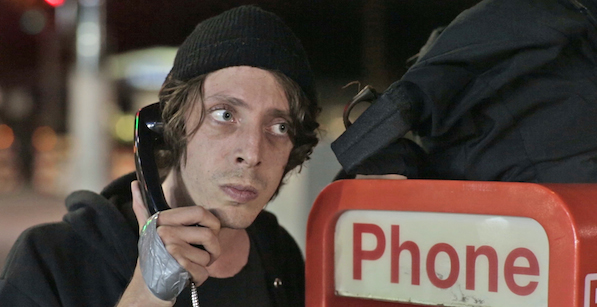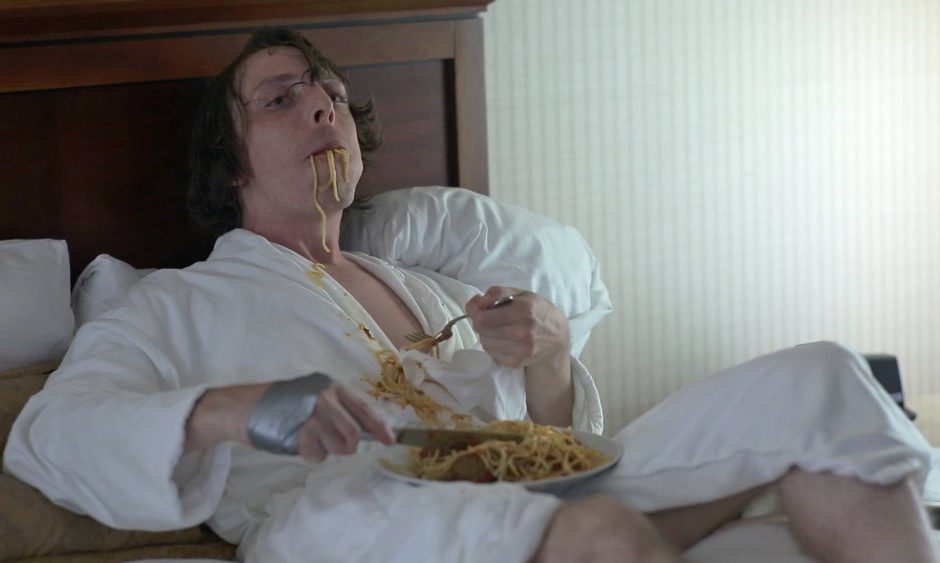Comfortably splayed on a hotel bed, freshly scrubbed from a shower, Marty Jackitansky (Joshua Burge) doesn’t look like he quite belongs in his hotel-issued white terry robe, a plate of overpriced spaghetti in his hands. He eats noisily, savagely, desperately. He watches television and quickly loses himself in the reverie, a welcome respite from the self-inflicted terrors of his life. This centrepiece scene in Joel Potrykus’ Buzzard lasts five minutes. The passing of its time becomes almost punitive to the viewer. As Marty eats, as he gets drawn into the banality of televised entertainment, as we are forced to reckon with the steady accumulation of his many disastrous financial decisions that have led to this particular moment, where Marty can delude himself into thinking that the $180 he has impulsively spent on the night can wash away his shitty life, one can’t help but pick apart the absurdity of the luxurious conveniences he has paid good money for as the clock ticks closer to his check-out time.
One can’t help but think about the vast distance between the codification of upper-middle-class culture (the expected civility of the hotel concierge, the plushness of that terry robe) and the ninety-nine percent of society, those of us who still aim to have a shot at affording this ridiculous lifestyle. The films reminds the viewer that Marty is not too far away from any of us, no matter how financially well-to-do we may be. But he’s more honest, and raw, more oblivious, and Potrykus knows how to spin his anti-hero’s cavalier attitude into something not only frank and revealing, but also funny. When Marty calls room service to inquire about “free stuff” that he gets with the room, he’s corrected by the phone attendant: the word he’s looking for is “complementary.” What’s more funny: Marty’s ignorance about such terms, or the fact that capitalist culture has deemed an actual difference between “free” and “complementary” and convinced poorly paid hotel staff to reify that distinction? Such scenes cement Buzzard’s place as one of the most damning contemporary independent films about American capitalism in some time.
The film balances this critique with another of its protagonist, revealing the fixed, violent chasms of his fucked-up psychology but also endearing us to him. Marty is a scam artist, pure and simple. He beats off during his temp job, in which he makes an abysmal nine dollars an hour, testing just how many hours he can get away with before anyone notices his absence. He orders unnecessary office supplies to later “return” at an office-supply store, pretending to have forgotten his receipt and reaping cash. Always on the lookout for inventive ways to scam money, Marty is delighted to find out that checks can be signed over to someone else’s name and uses this loophole to steal a bunch of cheques from his workplace, stupid enough to believe he won’t be caught.

Buzzard opens with a long take similar to the spaghetti-eating scene, a close-up of Burge’s apathetic face as he calmly goes through the procedure of quietly and ruthlessly closing his checking account at a bank and then re-opening the account in order to reap the bank’s fifty-dollar bonus offered to customers opening new bank accounts. He knows he’s ripping off the system. He knows he will encounter baffled customer service people who have been brainwashed into caring about what’s right (again, the film asks us who’s more of a loser, Marty for going through the embarrassing process of pulling off such a scam, or the bank manager who is stupidly invested in his job and is genuinely envious of Marty’s ability to take off work for three hours). Marty doesn’t care, and he doesn’t expect anyone else to, either. Most of the time, they put up very little struggle in getting him the petty amount of cash he’s so insistent on. Though Buzzard poses serious questions about the psychological aftermath of the economic recession on poor Americans, it uses an extreme and violent example to get us there, of an angry young man with deep-rooted hang-ups that are also just downright weird and immature, with his Halloween monster masks, his comic-book spinning rack that he clearly pilfered from a store, loaded with Tales from the Crypt comics, and the Nintendo Power Glove that he turns into a Freddy Krueger claw glove and eventually uses to get himself out of criminal situations.
Potrykus’ interest in revealing the depravity of American capitalist systems and their reflection in angry young white men goes back at least one movie. Ape also stars Burge as Trevor Newandyke, a struggling stand-up comedian (based on the director’s own experience) who just so happens to enjoy lighting things on fire. This man-child is so desperate for a better life he becomes seriously convinced that eating a golden apple given to him by a man in a devil costume will change his life. It will make him funny, it will give him the confidence he needs to succeed in what is generally known to be a dead-end career, it will get his canceled cable television back. The unfunny Trevor, tasked with the unsavory job of hawking the comedy show and the bar to passersby, is upstaged and contrasted with a competing comic named Spicer (Gary Bosek), who possesses perhaps only an ounce more charisma and talent than Trevor, and who gets very close to convincing two elderly women to come into the bar before Trevor embarrasses him and ruins their chance of getting paid for the night. The rivalry between these two men becomes a joke, paradoxical given that neither are very good at delivering them onstage.
In many ways, Ape feels like a workshopped version of Buzzard, a precursor of things to come for Potrykus’ cinematic vision. His feature debut is still plenty fascinating, however, particularly its depiction of stand-up comedy for the existential hellhole that it is, exploring the lives of the dregs who feel compelled to drag themselves up on stage night after night, repeating the same material, tweaking delivery only slightly to see if it gets a bigger laugh (or a laugh at all), their souls continually crushed after bombing one set after another. Trevor finally starts to get some laughs after eating the apple, boldly doing it on stage to take up his set time, but is it because of the devil’s magical powers or because Trevor finally stops giving a damn about making people laugh, and reveals his raw nature?
Potrykus has long been interested in connecting his characters to their animal equivalents. Coyote is the first of this trilogy and his first film with Burge, a simple, fun, punk short exercise that theorizes the Jekyll and Hyde-like existence of drug addicts: Burge physically turns into a coyote and devours people, possibly because of his heroin addiction. Like a werewolf, his existence is very cyclical. Get high, pass out, wake up, try to score some more dope, repeat. What more is there to do in Michigan? The industrial wasteland that the coyote wanders through doesn’t seem to promise much of anything else, and the few wonders it does produce (like obnoxious girls dancing to a boombox), are pretty lame. The first two films of Potrykus’ animal trilogy have somewhat aimless narrative trajectories that match the hopelessness of their protagonists’ lives—technically this is a flaw, yet both films remain rather enjoyable in their anarchic digressions—but with Buzzard Potrykus affirms his ability to fine-tune the character study into something so precise it’s surprising just how well it satisfies. He delivers a sublime damnation of the callousness and impersonal nature of our corporate social structures, their absurdity, their flimsiness, ultimately revealing the artificiality of a capitalist system that’s just waiting to be overtaken by our intrinsic animal urges.




